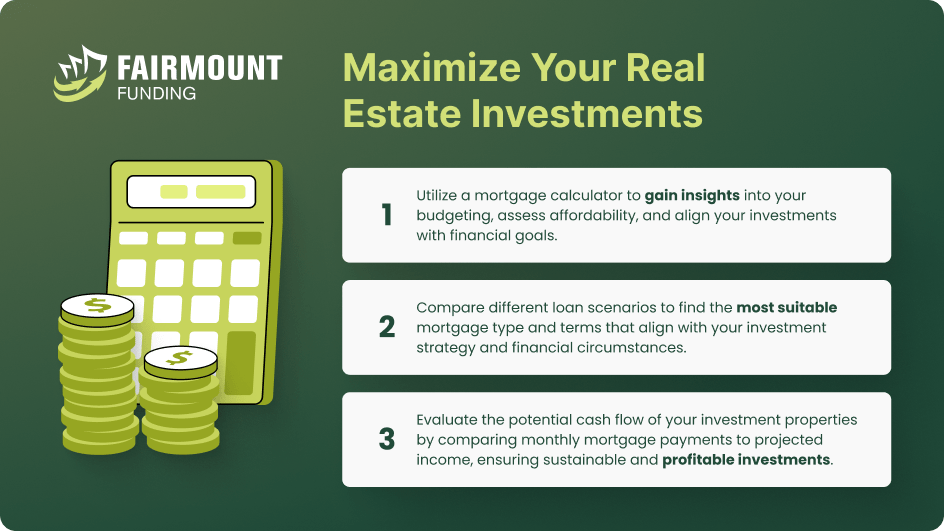
If you are thinking of buying a new home or refinancing your existing mortgage, it is imperative to have a clear understanding of your financial commitments. A mortgage calculator can give you an estimated amount of your monthly payments and make informed decisions.
Using the Fairmount mortgage calculator, all you need to do is input the required information like the loan amount, interest rate, loan term, and down payment. It will provide you with an estimate of your monthly mortgage payment in just a couple of clicks. This information allows you to discern whether a particular mortgage option aligns with your financial goals.
Whether you are a first-time or seasoned property investor, using this tool can provide valuable insights into your budgeting and planning.
How to Compute Your Mortgage
Property investors can compute their mortgage by following a straightforward process:
- Loan Amount. Start by identifying the total loan amount you plan to borrow. A good start would be the property’s purchase price minus the down payment.
- Interest Rate. Look for the prevailing interest rates offered by different lenders.
- Loan Term. Decide how long you would want to pay your loan. It can be 15, 20, or 30 years. Keep in mind, though, that the length of the loan term can impact the overall cost of the mortgage and the monthly payments.
- Down Payment. Determine the down payment amount you can make. It is usually a percentage of the purchase price and can vary depending on the loan type and lender requirements.
Once you have these details, you can learn how to calculate adjustable rate mortgage in Excel or an online mortgage calculator. The latter is more efficient and provides you with an estimated amount of your monthly mortgage payment quickly. Regardless, you should consider the principal amount borrowed and the interest charges when computing your mortgage.
Why should property investors use a mortgage calculator?
Using a mortgage calculator gives you the necessary information when deciding about your property investments. Listed are some of the reasons property investors should use a mortgage calculator:
- Financial Planning. Using a mortgage calculator allows you to plan your finances. By inputting the needed parameters, you can assess the impact on your monthly mortgage payments. This helps determine the affordability of an investment property and ensures it aligns with your financial goals.
- Comparison of Mortgage Options. There are various mortgage options available to property investors. Fortunately, you can use a mortgage calculator to compare different loan scenarios. This enables you to choose the option that best suits your investment strategy and financial circumstances.
- Cash Flow Analysis. Property investors must evaluate the cash flow potential of their investment properties. You can use a mortgage calculator for comparing monthly mortgage payments to the projected income of your properties. Thus, you can see the cash flow and profitability of your investments.
- Budgeting and Affordability. Calculating mortgage payments helps property investors establish a realistic budget and understand the affordability of a property. This is essential in preventing overextending financially and ensuring the investment remains sustainable in the long term.
- Understanding the Impact of Interest Rates. Mortgage calculators let you explore the impact of interest rate changes on your monthly payments. As such, you can make informed decisions based on the fluctuations in your mortgage payments.
Pennsylvania Mortgage Calculator
As with other states in the country, the Pennsylvania real estate market is undergoing a period of change. Median property prices in The Keystone State increased by 7.1% between February 2022 and February 2023. Despite this, the real estate cost in Pennsylvania remains affordable.
However, due to high mortgage rates, it takes a while for properties to sell. You also need to factor in property taxes and homeowners when using a Pennsylvania mortgage calculator to compute your monthly payments.
Property taxes in the state vary widely from one county to another and typically range from 0.87% to 2.45%. That is because each county has its rates and methods of assessing a home’s value. On the other hand, PA homeowners insurance is relatively affordable at $1,720 a year.
Choosing the Best Mortgage
Choosing a suitable mortgage for your property investments requires considering several factors. This includes the following:
- Your Financial Situation. Start by evaluating your financial position. Determine how much you can afford for a down payment and monthly mortgage payments. Consider your income, savings, and other financial obligations. This assessment will help you establish a realistic budget and narrow your mortgage options.
- Mortgage Types. Familiarize yourself with different mortgage types available to property investors. This includes fixed-rate mortgages, adjustable-rate mortgages (ARMs), interest-only mortgages, and government-backed loans. Know the pros and cons of each type and how they align with your real estate investment goals.
- Interest Rates. Research and compare interest rates offered by various real estate property investment lenders. Even a slight change in interest rates can affect your long-term financial obligations. Consider obtaining quotes from multiple lenders to ensure you secure the most competitive rate for your mortgage.
- Loan Terms. Analyze different loan terms, such as 15-year, 20-year, or 30-year mortgages. Shorter loan terms often have higher monthly payments but result in substantial interest savings over time. On the other hand, longer terms offer lower monthly payments but may result in higher overall interest costs.
- Fees and Closing Costs. Consider each mortgage option’s fees and closing costs. These can include origination fees, appraisal fees, and title insurance costs. Compare these charges among different lenders to determine the most cost-effective option.
Alternative Uses of a Mortgage Calculator
Aside from the purposes mentioned above, there are other ways you make the most out of a PA mortgage calculator. Here are other ways you can use a mortgage calculator.
Paying Off Your Mortgage Early
Utilizing Fairmount Funding’s mortgage calculator can help you determine how you can pay your mortgage in the shortest time possible. You can do this by making additional payments towards the principal. You can make these extra payments on a monthly, yearly, or one-time basis.
Evaluating the Worth of an ARM
Although the lower initial interest rate of an adjustable-rate mortgage (ARM) may seem appealing, it is essential to assess its actual impact on monthly payments. You can do this by plugging in the ARM interest rate into the mortgage calculator, keeping the term as 30 years, and comparing the result with those of a conventional 30-year fixed mortgage. This will help determine whether the anticipated benefits of an ARM align with the risks involved.
Removing Private Mortgage Insurance
Utilize the mortgage calculator to calculate when you will reach 20% equity in your home. This is the critical threshold for requesting the removal of private mortgage insurance (PMI) imposed by lenders.
If your down payment is less than 20%, you need to pay an additional fee in addition to your monthly mortgage payment. This fee disappears once you achieve 20% equity, allowing you to keep more money in your pocket.
Fairmount Mortgage Calculators FAQs
Is an online mortgage calculator accurate?
Mortgage calculators online provide an estimated amount of your monthly mortgage payments based on the information you input. Hence, the results may reflect something other than the exact figures you will receive from a lender. It is advisable to reach out to a mortgage lender, such as Fairmount Funding, for precise and personalized information.
What is the average interest rate on a mortgage?
The average mortgage interest rate can vary depending on the type of mortgage, current market conditions, creditworthiness, and loan term. Economic factors like inflation and government policies also influence them. We recommend that you research current interest rates from various lenders or consult with a mortgage broker to get an idea of the prevailing rates for your specific circumstances.
How can I reduce my mortgage payment?
There are several strategies to reduce your mortgage payment potentially:
- Refinancing
- Making extra payments
- Modifying loan terms
- Down payment assistance
- Making a property tax assessment appeal
Whether these tactics work will depend on your circumstances, financial goals, and mortgage terms. Consult with a mortgage professional to explore the options that best align with your situation.
Mortgage Calculators: A Valuable Tool for Property Investors
A mortgage calculator can be one of your most valuable tools. For one, it can quickly provide an estimated amount of monthly mortgage payments. This allows you to make informed decisions about your property investments.
Second, mortgage calculators enable you to compare different mortgage options. That way, you can explore the impact of interest rate changes and assess how much you can save if you make extra payments.
Whether you are new to property investing or a seasoned real estate investor, this tool can simplify complex calculations and clarify the financial aspects of your assets. If you are ready to secure your property investments, give us a call so we can give you precise information about your mortgage payments.
KEY TAKEAWAYS
- A mortgage calculator can give you an estimated amount of your monthly payments and make informed financial decisions.
- Median property prices in Pennsylvania increased by 7.1% between February 2022 and February 2023. Despite this, the real estate cost in Pennsylvania remains affordable.
- Choosing a suitable mortgage for your property investments requires considering several factors like mortgage type, interest rates, and loan terms.


